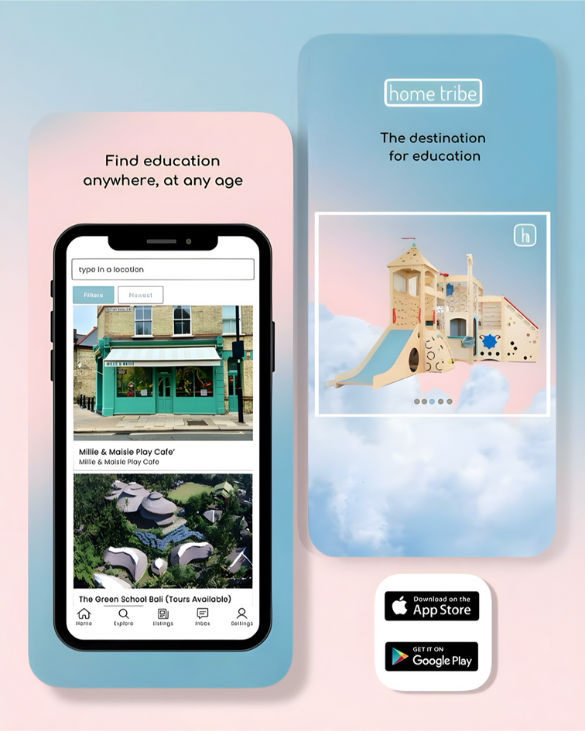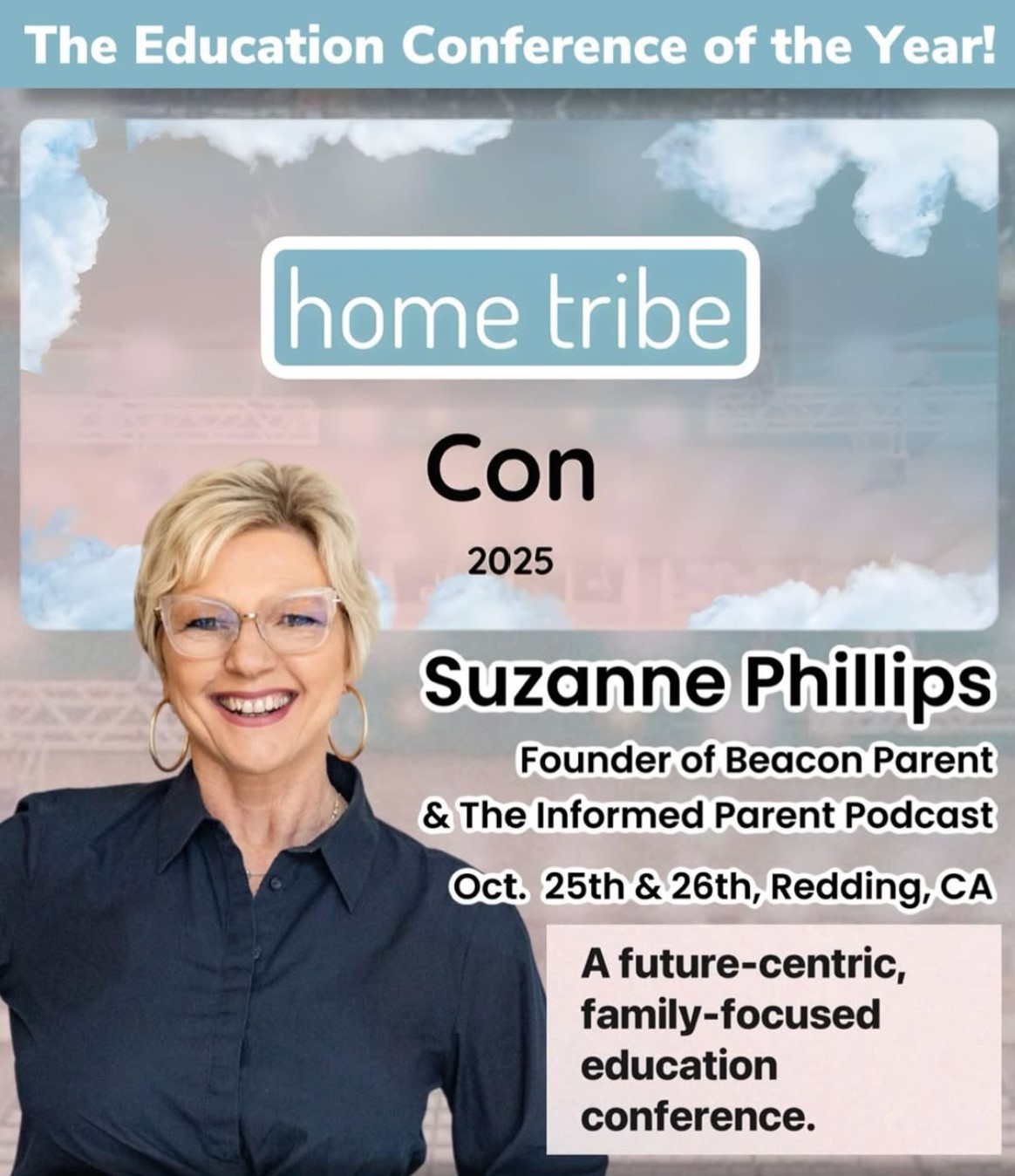Education Anywhere: The Home Tribe Education Revolution
AmericanMom Team |
Where were you when you first realized the government was overstepping bounds, stripping parents of their rights, and targeting children with poisonous ideology? If you were putting your babies to bed, making dinner, or in a school board meeting, then your heart probably broke as you thought about your children’s future. The world has shown its true colors and now we must respond — but how do we build something that meets parents where they are and give them what they need to be successful for the sake of their children? These questions plagued Home Tribe founder Emily for years as she created her company and made it the bastion of educational resources it is today.
We were lucky enough to get a moment of Emily’s time and talk to her about Home Tribe, what it means, why it’s necessary, and how it reshapes the parent’s approach to home education.
“They didn’t believe that the government was slowly moving in to revoke our parental rights, and no one ever thought homeschool or alternative education would be mainstream. It took 10 years of building and fallout of education during COVID for the vision to fully emerge, but I can now see our purpose at Home Tribe is crystal clear.”
Education Anywhere
There was heart and good intention behind the founding of America’s public schools. The practice goes back many years, often serving as a way to ensure children who were really far away had the chance to formally learn what they may not otherwise encounter. Unfortunately, like everything the government touches, it has declined in value over the years. Parents and students question now more than ever why education has to be defined by sitting at a desk, acing a test, and making friends.
What would be the evil in letting children explore the world outside the classroom? Structure is good, discipline is good, but education should be about wonder, experimentation, adventures, play, creativity, and the pursuit of passions just as much as it should be about understanding the fundamentals. How do we strike a balance between the two?
AmericanMom (AM): Tell us about Home Tribe! What personal and educational experiences led you to homeschooling and ultimately to founding Home Tribe?
Emily Jones: Home Tribe is the destination for education – An app on iOs, Android, and mobile web that connects families, educators, and providers for learning experiences and family-experiences around the world.
I was raising my 2 little boys (ages 2 AND 3) in the midst of California revoking medical and religious freedoms with the horrific CA bills – SB276 and SB277. I saw the beginning of fallout from public education in our town around 2014. Educators were coming home to educate their own children, and parents were becoming increasingly aware and concerned about the slow but constant power grab from the government, and how bad bills in California were aimed right for our children, affecting our families medical and religious freedoms as well as access to education.
At the time of this government overreach beginning in CA, I became a freelancer, creating websites for clients and gaining skills in UX/UI design while my babies took naps and played. I created the first prototype for Home Tribe, a simple website that connected parents and educators together at parks, churches, and in our homes for early learning experiences. I saw it as a way for educators who left their careers and stay-home parents to make a small income, or trade time to provide learning experiences for our little ones. I never stopped working on Home Tribe, even though I paused and took breaks over the years. Many people thought my work was irrelevant for many years. They didn’t believe that the government was slowly moving in to revoke our parental rights, and no one ever thought homeschool or alternative education would be mainstream. It took 10 years of building and fallout of education during COVID for the vision to fully emerge, but I can now see our purpose at Home Tribe is crystal clear, and ever so needed for the current education revolution we are in today.

AM: Growing up in California, how did your roots shape your passion for “education anywhere” and your drive to support educational freedom?
Emily: I was born and lived in the California country until I was about five years old with my four brothers and sisters, and I was homeschooled (more so Unschooled) until the 3rd grade. My brothers are about 7-8 years older than me, and I grew up watching them embark on wild adventures in the country. Even when we moved into the city, they were able to immerse themselves in their passions like music, art, church, work, and friends.
I never questioned why they didn’t go to school. They were so busy with their lives, the thought never even crossed my mind. When I turned about nine, my mom and dad had to send my sisters and I to school. I was asked to take a placement test for my new school to assess where I was academically. I was told I was in the GATE program (Gifted and Talented Education program). I had done nothing up until that point but play with my brothers and sisters and read books.
From that point on until after college, I never really understood what the actual purpose was in my education other than sitting at a desk, bored to tears, listening to the teacher drone on and on. I was also painfully shy and it was hard for me to make friends because I never really felt like I fully fit in.
Having been Unschooled until the 3rd grade, and then experiencing such a stark contrast after enrolling into public school, deeply shaped my current opinions on education as a whole. This combination of my two very different educational experiences made me realize that education could be anywhere, and maybe SHOULD be anywhere except for a public school classroom. I felt free and unbridled as an Unschooled child, but deeply unsettled and trapped as a child in public education.
AM: You’ve recently shared posts highlighting resistance to CA’s AB 84, which could increase bureaucracy in non‑classroom-based education. What role does Home Tribe play in supporting families and schools impacted by policies like this?
Emily: In addition to being a tool that helps families find alternative educational experiences for families who need alternative options due to these bad bills affecting our educational freedoms, Home Tribe also acts as an advocating voice to relay the latest updates on bills that affect families in our community. We also rely on our community and fellow advocates to relay critical information on our social media platforms as well as our newsletters so that families have multiple touchpoints from us and our fellow advocates when seeking help and guidance for their educational needs, and to understand complex bills arising that affect our educational freedoms so we can prepare and plan accordingly.
Home Tribe’s mission is to “connect families & educators for learning anywhere.” This mission looks beyond the classroom, and outside of the long-accepted standards. We asked Emily how this is achieved through Home Tribe because, at the end of the day, we need actionable solutions and community, not just concepts and theories.
“Home Tribe is a very simple, user-friendly platform,” says Emily. “You can either download the app on iOs or Android, or use it on mobile web at hometribe.com. You just simply type in your current location or the location you want to find learning experiences/family friendly experiences in, and live listings in your area will pop up. If you want to sign up as a parent, you can easily create a profile, but you don’t have to do that to browse. You can send a provider a message once you are signed up and logged in, and review companies if you have used their service. As a provider, you can create a listing on Home Tribe for your educational or family-friendly business in under 5 minutes.”
And the platform is growing! “We have big plans to expand our feature sets to offer discounts, and offer bookings directly on the platform for local and online experiences very soon!”
Alternative Education
Various forms of alternative education rake in praises and criticisms in equal measure. It’s hard to shift the mindset, especially when we can all agree that education improves societies—we don’t want to lose that at any cost. So there has to be a concerted effort to educate the public about their options and ensure there is support for whatever path they choose. 
AM: For families exploring alternative education or homeschooling for the first time, what empowering advice would you give?
Emily: Start with observing your children where they are today in their natural giftings, passions, and talents. Every child has a unique purpose from birth to fulfill on Earth, and it’s our duty as parents and educators to help fan that flame, and guide each child to their unique purpose. I feel that education can always be crafted per individual learner by mixing in different approaches to curate eclectic learning experiences for our children. Some children thrive in structure, some thrive in free form education. It’s our job to be observers of our children first, then guide and build with them to create an individualized learning plan that suits their unique personalities and giftings.
AM: For the family ready to transition from public to homeschooling, what is one resource you would recommend to make that switch easier?
Emily: Home School Legal Defense Association (HSLDA) is a staple in the USA for the homeschool community to understand homeschool laws per state. I always recommend making sure families understand homeschool laws in their state so that they then can prepare themselves to disenroll from their current education institution, and enroll with the correct path per their state requirements. Understanding state laws will also open the door to the types of curriculum and education path their learners need in their state.
Finding a community to join eclectic learning experiences together throughout the week is very important. Families can find learning resources in their area with our app at Home Tribe to find and message providers of homeschool co-ops, pods, and local homeschool family learning experiences right in their neighborhood.
AM: In your opinion, what is the most broken part of public education?
Emily: Public education in my opinion isn’t broken, I believe that it’s working precisely how it’s been created to work by its founders. Traditional schools were meant to shape children into obedient followers and have them pledge allegiance to the belief system and indoctrination embedded into the daily schedule, the dictatorship teaching style, and the curriculum dripped in propaganda. Children and teachers in the system are also taught to demonise and ostracize the free thinkers in the system for speaking out or showing signs of leadership or autonomy. I believe this is all carefully crafted and designed to make learners a cog in the machine of a society owned by the few, and operated by the many without question.
AM: What advice do you have for educators and creators interested in contributing to Home Tribe?
Emily: We want education innovators to help us evangelize their company by listing their learning and family friendly experiences on the Home Tribe platform. We have multiple opportunities throughout the year for our providers to get featured to our community at different touchpoints including directly on our platform, getting featured in our newsletter, and special mentions on our social media channels.
We are still looking for education experts to speak at Home Tribe Con too! If you are interested in speaking, you can get connected with a team member for Home Tribe Con on our Home Tribe Con page.
The Home Tribe Experience
So there was a need – still is a need – and Home Tribe was designed to meet it. Offering educational resources, options, and opportunities to students K-12, including tutoring and outdoor education, Home Tribe has found the pain point for parents. “Our K-12 experiences are gaining the most traction because of how eager parents are to disenroll their learners as young as possible from traditional education,” says Emily.
Parents want, nay, need, options and alternatives. We are starving for independence from systems that no longer serve us, and may even be hurting our children.
“Parents across the US and internationally are not happy with government-run education, and want to be in charge of what our children are learning every day. We no longer want institutions to indoctrinate our kids. We want to instill our family values and give them real education free of propaganda,” explains Emily. But the problem goes deeper than just K-12. In fact, Emily says that their higher education opportunities are a close second when it comes to demand from parents. Through Home Tribe, Emily has found that many “homeschool families opt their learners into higher education opportunities as young as the 7th grade to prepare them for their careers, and advanced education.”

AM: You emphasize agile, flexible education and critical thinking. How do you embed these in the Home Tribe experience?
Emily: When we onboard and accept providers, we want to make sure that each experience offers a flexible and agile learning opportunity that can be curated or changed per a family’s needs. We want to make sure that when families choose a provider and opt into an experience, that they still feel they are in charge of what their children are learning. We promote and encourage a collaborative partnership between families and providers, where parents are always welcome, and providers are acting in the best interest of children and families according to the family’s preferences and values.
We aim to curate providers who offer and welcome critical thinking skills. We understand that there is a wide variety of ways providers can offer education, and that families have freedom of choice for all different learning styles and philosophies, but make sure before we onboard provider listings that providers are not hampering critical thinking skills, or teaching harmful or inappropriate ideology while doing so.
AM: What has been the most rewarding moment on your Home Tribe journey so far? And the greatest challenge?
Emily: It’s rewarding to look back and reflect on all of the incredible conversations, and collaborations with the brilliant minds that I have personally had the opportunity to interview and serve on the Home Tribe platform. Education professionals, advocates, and parents are making incredible strides in the education revolution. There are SO many powerful and committed people in this space, and I have been blown away by the collaboration and comradery that our education community brings forth each and every day. The greatest challenge is the daily fight for our freedoms and sovereignty as parents and educators today in America to preserve the future for our children. We have been fighting a war for a very long time. This war is on our children’s minds, hearts, and souls, and on the family unit. This education revolution is SO much more than what curriculum to choose or where to educate our kids.. It’s about teaching our kids to stand firm in their faith, think critically, and fight for the truth and our freedoms without hesitation.
Home Tribe Con
The best community is formed around a common purpose, passion, and goal. But when we’re separated by industries and states, it’s hard to feel that community. So it has to come together to explore and discuss what is most needed and new in the industry, not to mention what can be done to change to brighten the future for families across the world.

Home Tribe welcomes Suzanne Phillips and many more speakers to Home Tribe Con
AM: Home Tribe Con 2025 is described as “family‑focused,” “future‑centric,” and geared toward educational freedom. What inspired the creation of this conference, and what outcomes are you most excited to achieve?
Emily: After 10 years in my field, I have observed that there are a few pillars our community stands firm on each day, which led our team at Home Tribe to craft our 6 core values. In our 6 core values, we highlight the belief that family is always first, that parents hold the irrevocable right to choose how, when, and where we educate our learners, that we also hold the irrevocable right to make health decisions for our learners, and that we only promote educational experiences and curriculum that protect the innocence and safety of children and the preservation of our freedoms.
Our core values are future-centric in nature, as we are collectively moving away from the outdated archaic education and the 9-5 jobs system, and into the future where family is at the center of all we do – whether at home, while educating, or working. Home Tribe Con was created to bring our community of families, learners, and education leaders who are living naturally by our 6 core values together so that we may continue to learn from one another, and come away with new experiences and innovative solutions to further our mission to connect families, learners, and educators for education anywhere.
AM: You’ve brought together voices from across education, tech, and policy. What was your process for identifying voices that represent the future of education—and how do their sessions build on each other thematically?
Emily: Education (learning) is the nucleus from which we do and achieve anything in this world. There is a need and high demand for education in every field, every career, and in every sector. Education is the foundation of our society, policy shapes education, and tech drives almost every sector we rely on in our world today.
We have chosen prominent leaders with seasoned experience from diverse backgrounds and sectors to educate us on emerging trends in education, policy, and tech, so that we can better prepare ourselves and our learners for this ever-changing and uncertain future we are speeding into that will affect us all and in every aspect of our lives.
During Home Tribe Con, our sessions will naturally complement and build on each other as we dive into exactly how policy is shaping education, and where the future of education is headed in regards to new and emerging tech (both tech we should welcome and adopt, and tech we should be wary of and possibly reject).
AM: What new or unexpected trends in education policy or technology are you eager to highlight at HomeTribeCon?
Emily: With education policy, we ALWAYS expect the unexpected! We are prepared to update anyone in attendance with the most recent and detailed information regarding policies that are moving fast, and that affect and preserve our educational freedoms. We trust our education and family policy advocates and experts to provide us with pertinent up-to-date information in multiple formats during Home Tribe Con.
There are groundbreaking innovations emerging every day at the intersection of tech and education, and we plan on highlighting education innovators who are harnessing tech and AI to catapult our learners, parents, and education professionals into the future so they are ready to lead. Tech leaders speaking at Home Tribe Con will inform us of their new technologies and strategies that are streamlining education and supporting education businesses so we can opt into these technologies to support our educational and business goals after Home Tribe Con.
AM: What milestones are on the horizon for Home Tribe in the next 12–24 months—new features, partnerships, or expansions?
Emily: We plan on making incredible professional connections at Home Tribe Con that will allow for new education business partnerships to emerge in the next 12-24 months. Partnerships are mutually beneficial to our mission, and we always enjoy serving our partners’ marketing initiatives to help them reach new clients, markets, and communities in the education space who are eager to hear about our partners’ offerings.
We are very excited to re-launch features this year we have tested, including live online education and booking capabilities for learning, as well as family-friendly experiences around the world with special incentives and discounts for homeschool families, and families wanting to opt in to eclectic ways to educate their learners.
AM: How do you envision Home Tribe shaping the educational landscape as AI and emerging technologies continue transforming how we learn and teach?
Emily: Home Tribe will always be a destination for education, and we envision our destination taking many forms in the coming years as we add on new experiences, taking you to incredible new places created by education innovators both in-person and online. We are only as innovative as our providers on the platform, so we are welcoming education providers every day who are focused on creating future-centric solutions and experiences for our families to enjoy.
One thing will remain unchanged: our belief that family is the future, and we aim to create experiences that help us put our families first every day in everything we do.
The best news is that there’s still time to sign up for HomeTribeCon! (Oct 25–26 in Redding, CA)
When it comes to education, parents should have the ultimate control. Staying informed and protecting your rights as parents is a threat to the standard created by NGOs, special interest groups, politicians, and teachers unions who have zero connection to your students and little interest in truly improving education. It seems harsh to say, and there are fantastic teachers out there who care, but the system is no longer serving every child, so why not create a world where education can be anywhere?
Ready to join the movement? Have a business that provides educational resources? Find your place at Home Tribe!






